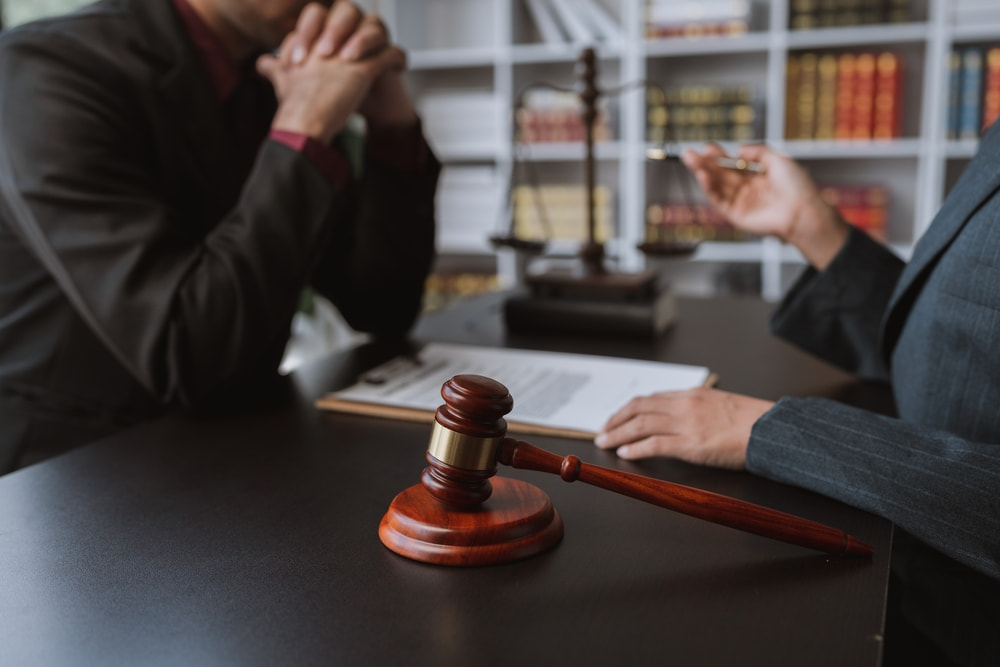What Does “Status Conference” Mean in a California Criminal Case?

A status conference in a California criminal case is a meeting to discuss the case’s progress, exchange information, and explore plea deals. It’s a key step in preparing for trial or resolving the case.
Imagine prosecutors charged you with a crime in Los Angeles. Suddenly, you’re thrust into the criminal legal process, facing numerous hearings and conferences. It’s scary, overwhelming, and confusing.
One key event you’ll encounter is a status conference.
It often goes like this:
You’re sitting in a courtroom, unsure of what to expect next. Your lawyer explains that today is your status conference, a critical step in your case that shapes the path forward, influencing decisions about evidence, plea deals, and trial readiness.
This article explains a status conference and what you can expect during one in Los Angeles. Understanding what’s ahead prepares you, boosts your confidence, and helps you how a criminal defense lawyer navigate your legal journey.
Quick Navigation Menu
- What Is a Status Conference?
- What Happens at a Status Conference?
- When Does a Status Conference Happen?
- Who Must Attend a Status Conference?
- Could Your Case be Resolved at the Status Conference?
- How Do I Prepare for a Trail?
- Contact a Lawyer for Help Defending Your Criminal Charges
- Tips for Communicating with Your Lawyer
- Why You Need a Lawyer if Prosecutors Charged You With a Crime in Los Angeles
What Is a Status Conference?
A status conference in a criminal case is a meeting between the prosecutor and the defense attorney (your attorney) to discuss the status of the case, exchange information, and potentially negotiate a plea deal. Sometimes, the judge is involved in the status conference.
What Happens at a Status Conference?
If you are charged with a felony or a misdemeanor in Los Angeles, you will likely need to attend a status conference or something similar.
For a misdemeanor case, this is called a trial readiness conference. You, your lawyer, and the prosecutor must be present.
During the trial readiness conference, the prosecutor will give you and your lawyer information they plan to use to prove your guilt, called “discovery.”
Your lawyer and the prosecutor might also talk about a plea deal. If they cannot agree on a plea deal, the judge may ask if the case is ready for trial.
Courts can schedule multiple Trial Readiness Conferences during your case to check its progress.
If you are charged with a felony in Los Angeles, you might need to attend a felony settlement conference. This is like a trial readiness conference but happens before the preliminary hearing.
At the felony settlement conference, lawyers exchange information, discuss resolving your case, and inform the judge if the case is ready for trial.
Before the trial readiness conference, the court might also consider any pre-trial motions, like requests to suppress evidence or address probable cause issues.
When Does a Status Conference Happen?
Status conferences will happen throughout your trial. This is so the court can stay updated on the status of your case. However, the court may set a trial readiness conference within 1 to 14 days before a felony trial.
Who Must Attend a Status Conference?
For status conferences addressing minor issues, your lawyer might waive your appearance, and only your lawyer, the prosecutor, and the judge are present.
However, you, your lawyer, and the prosecutor must be present for a trial readiness conference or a felony settlement conference.
Additionally, the court may allow you to appear by phone for certain status conferences.
Could Your Case be Resolved at the Status Conference?
Some cases can be resolved at the status conference through a plea deal. One reason for having status, trial readiness, and felony settlement conferences is to try to settle cases before a trial.
However, resolving your case at the status conference depends on multiple things.
First, it depends on the discovery provided by the prosecutor. If your lawyer does not have enough information to decide whether the prosecutor’s plea is reasonable or the discovery shows that you may have a valid defense to the charges, you may not resolve the case before a trial.
Second, it depends on the plea offered by the prosecutor. If favorable, your lawyer may suggest you take the plea deal.
If the plea deal is unsuitable, your case still needs resolution.
Finally, it depends on you. If you want to resolve the case by taking a plea deal at a status conference and avoiding a trial, you can speak with your lawyer.
If you want to go to trial, the case will not be resolved at a status conference and will likely be set for trial (you should talk to your lawyer about taking a case to trial).
As stated above, multiple status conferences may be set during your case. So, if you are not ready to take a plea deal at one status conference, you can take the same plea deal at another later status conference.
It is also possible that the plea deal changes because the prosecutor or your lawyer discovers new information or your lawyer negotiates a better plea deal.
However, the court may set your case to trial if you cannot reach a plea deal.
How Do I Prepare for a Trail?
Your lawyer or the prosecutor will not present witnesses or evidence to the judge or a jury. You will not testify. You will not need to worry about all of that.
Instead, the status conference is an opportunity for you, the lawyers, and the court to keep the case moving toward a resolution.
The best way to prepare is to be present or make sure you are in contact with your lawyer. Your lawyer may have many questions about the discovery or evidence provided by the prosecutor.
Your lawyer may also have questions about the plea deal offered by the prosecutor and whether you may want to take the plea deal or go to trial.
Similarly, you may have many questions for your lawyer about the status of your case, how to resolve it, and what will happen next.
You can only remain updated if you appear at the status conference and remain in contact with your lawyer.
Contact a Lawyer for Help Defending Your Criminal Charges
You should also be ready to work with your lawyer to find information that may help your lawyer as they negotiate a plea deal or as they head toward trial.
You may have additional evidence or witnesses that defend the charges or show that you are innocent. Having this information or being willing to locate it between status conferences helps your case.
Finally, prepare to consider resolving your case through a plea deal. If your lawyer suggests you take the prosecutor’s plea deal or if you want to take the plea deal, you should have an honest conversation with your lawyer about what that means for you.
If you take the plea deal, you should also prepare your affairs so there are no additional negative consequences (i.e., loss of employment, childcare, etc.).
Tips for Communicating with Your Lawyer
Effective communication with your lawyer is crucial to navigating your criminal case successfully.
Here are some practical tips:
Be Honest and Open
Share all the details of your case with your lawyer, even if they seem unimportant or embarrassing. Your lawyer needs a complete picture to build the best defense for you.
Ask Questions
Don’t hesitate to ask your lawyer questions.
Here are some you might consider:
- What are the possible outcomes of my case?
- What is the best strategy for my defense?
- What should I expect at the next status conference?
- What are the pros and cons of accepting a plea deal?
Stay Informed
Keep up with the progress of your case by regularly checking in with your lawyer. Ask for updates and understand what is happening at each stage.
Prepare for Meetings
When meeting with your lawyer, bring any documents or information that might be relevant. This includes anything you receive from the court or the prosecutor.
Discuss Your Options
Talk openly with your lawyer about your options, including potential plea deals and the likelihood of success at trial. Make sure you understand the implications of each choice.
Keep Track of Deadlines
Ensure you know all the important dates related to your case, such as court appearances and filing deadlines. Missing a deadline can negatively impact your case.
Follow Your Lawyer’s Advice
Trust your lawyer’s experience and follow their recommendations. They have the knowledge to guide you through the legal process.
Prepare for Plea Deal Discussions
Discuss a plea deal thoroughly with your lawyer if it is on the table. Understand what it means for your case and your future.
Weigh the benefits and drawbacks carefully before deciding.
With this strategy, you work more effectively with your lawyer, stay better informed, and make educated decisions that positively impact the outcome of your case.
Why You Need a Lawyer if Prosecutors Charged You With a Crime in Los Angeles
You need a lawyer if a prosecutor has charged you with a crime in Los Angeles.
Here’s why:
- Experienced Guidance: A lawyer understands the legal system and can guide you through each step, explaining complex procedures and terms.
- Protect Your Rights: A lawyer will protect your rights, preventing potential violations that could harm your case.
- Building a Defense: Your lawyer will gather evidence, question witnesses, and develop a strong defense strategy tailored to your situation.
- Negotiating Plea Deals: If a plea deal is an option, a lawyer can negotiate on your behalf, aiming for the best possible outcome.
- Court Representation: A lawyer will represent you in court, presenting your case effectively and countering the prosecution’s arguments.
Having a skilled lawyer by your side can make a significant difference in the outcome of your case, giving you the best chance for a favorable result.

CONTACT A CRIMINAL DEFENSE ATTORNEY
Facing criminal charges in Los Angeles? Trust The Rodriguez Law Group Los Angeles Criminal Defense Attorneys to secure the best possible outcome. Our experienced criminal defense lawyers have 20+ years of expertise in handling criminal cases.


